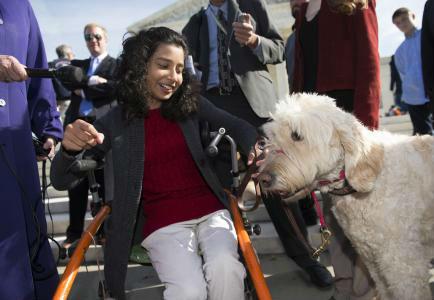Girl with cerebral palsy wins Supreme Court case after her school banned service dog
Ehlena Fry had been supported by the American Civil Liberties Union
Your support helps us to tell the story
From reproductive rights to climate change to Big Tech, The Independent is on the ground when the story is developing. Whether it's investigating the financials of Elon Musk's pro-Trump PAC or producing our latest documentary, 'The A Word', which shines a light on the American women fighting for reproductive rights, we know how important it is to parse out the facts from the messaging.
At such a critical moment in US history, we need reporters on the ground. Your donation allows us to keep sending journalists to speak to both sides of the story.
The Independent is trusted by Americans across the entire political spectrum. And unlike many other quality news outlets, we choose not to lock Americans out of our reporting and analysis with paywalls. We believe quality journalism should be available to everyone, paid for by those who can afford it.
Your support makes all the difference.This is a dog with quite a tale.
America’s highest court has sided with a teenage girl with cerebral palsy who has spent years fighting school officials for the right to bring her service dog to class.
The parents of Ehlena Fry, 13, from Michigan, have for years been involved in an on-and-off battle with officials to allow her to take her dog, Wonder, a cross between a golden retriever and a poodle and nicknamed a goldendoodle, to class with her.

The girl’s parents originally sought to allow her to use Wonder when she started kindergarten and was suffering from severe mobility problems. Wonder was specially trained to help open doors, pick up items and give Ehlena a measure of independence, the Associated Press said.
But her school district, 75 miles southwest of Detroit, initially said Wonder could not accompany her and insisted instead that adult aides could help Ehlena.
School officials later relented to some degree, but placed so many restrictions on the dog that Ehlena’s parents instead took the decision to home-school her. She later transferred to a different public school that allowed her to take the dog with.
On Wednesday, the court’s justices ruled unanimously that federal disability laws might allow Ehlena pursue her case in court without first having to wade through a lengthy administrative process.
The ruling is a win for advocacy groups that want to make it easier for disabled students to protect their rights under the Americans with Disabilities Act. School officials had argued that administrative remedies are an easier and less costly way to resolve educational disputes.
Writing for the court, Justice Elena Kagan said exhausting the administrative process is not always required in such cases. But she said further fact-finding is needed to decide whether the teenager can pursue her case in court.
Lower courts had ruled against girl, saying she first had to try informally resolving her dispute with the school district.
“We’re thrilled that the Supreme Court has torn down unfair barriers faced by students who seek to vindicate their rights under the Americans with Disabilities Act,” said Michael Steinberg, legal director of the American Civil Liberties Union in Michigan.

Join our commenting forum
Join thought-provoking conversations, follow other Independent readers and see their replies
Comments